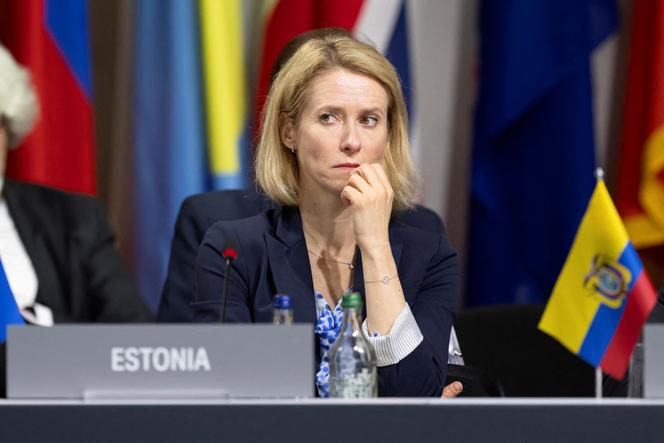
Until February 2022, liberal Kaja Kallas was little known outside her country’s borders. At the time, the Estonian was only the prime minister of the smallest of the Baltic States. Russia’s full-scale invasion of Ukraine changed all that: an advocate of unconditional support for Ukraine, she found herself propelled onto the international stage. On Thursday, June 27, at the European Council, the 47-year-old was appointed High Representative of the European Union and Vice-President of the European Commission, a post held until the autumn by Spanish socialist Josep Borrell.
After considering the post of NATO Secretary General (Mark Rutte eventually won the job on Wednesday), she ended up leading an assiduous campaign, backed by the whole of Central and Eastern Europe, to become the future foreign minister in Brussels, just as her star in Tallinn is seriously fading.
In the summer of 2023, a first scandal involving her erupted. The Estonian media revealed that the logistics company 25% owned by her husband, Arvo Hallik, who was also its CFO, had links with a company that was still active in Russia. This was a sharp blow for Kaja Kallas who came to public attention for her repeated warnings against Moscow’s incessant threats against Kyiv just a few months before the Russian invasion of Ukraine.
A mother deported by the Soviets
More recently, her government, which is campaigning on the international stage for increased defense spending, has been accused by Estonian Army Chief of the General Staff General Martin Herem of under-funding the country’s defense. His party came third in the European elections.
This outspoken former lawyer won’t be lost in Brussels where she began her political career. She was an MEP from 2014 to 2018 before returning to Tallinn to head the center-right Reform Party which was founded by her father Siim Kallas in 1994. He is no stranger to Brussels. After serving as prime minister of Estonia, he became his country’s first European Commissioner for 10 years in 2004 when it joined the EU.
The history of the Kallas family is also closely linked to that of Estonia. From 1918 to 1920, Kaja Kallas’ paternal great-grandfather commanded the Estonian Defense League during the War of Independence. After the armistice, he became the first chief of police of the newly-formed Republic of Estonia.
Over the past two years, Kaja Kallas has also spoken about the fate of her mother, Kristi, who was deported at the age of 6 months by the Soviet occupiers in 1949 along with her own mother, her grandmother and 20,000 Estonians to Siberia. She regularly evokes her family history in her long struggle against Russia. In mid-June, at a conference for peace in Ukraine organized by Switzerland, she said, “many countries have suffered from colonialism, including my country, which was part of Russia, a colonial state, for almost half a century until 1990 (…). At that time, there were many discussions about peace but it was peace on Russian terms with the oppression of all that was Estonian.”
You have 48.29% of this article left to read. The rest is for subscribers only.